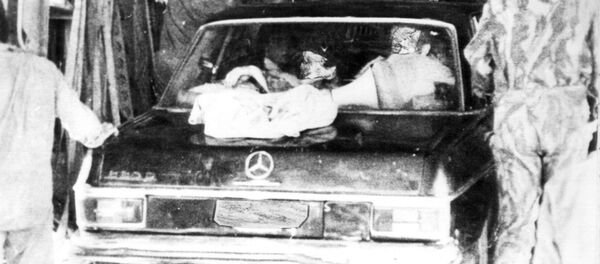It was a terrorist attack that shook Israel.
In April 1984, four Palestinian terrorists boarded a packed bus en route from Tel Aviv to Ashkelon.
Several minutes later they hijacked it, and forced the driver to change his route making their way to the border with Egypt, where hostages were supposed to be kept until the Israeli authorities agreed to exchange them for a number of Palestinian prisoners.
But things didn't go according to plan. After the IDF took control of the bus killing two of the terrorists, it also arrested the remaining attackers, an event that was heavily covered by the local media which showed them being taken alive by operatives from Shin Bet, Israel's security agency.
Next morning, however, the IDF released a statement claiming the four terrorists were killed during the rescue operation, but after the military realised there were too many eyewitnesses who saw them alive, it rushed to impose censorship on the coverage of the event. The latter is a common practice in Israel where the army can decide what items make it into the news cycle.
Shattered Reputation?
Although all major outlets adhered to the restrictions, one newspaper decided to publish the photos of the two terrorists arrested by Shin Bet, and proved they were executed by the agency's operatives, who didn't care about making them stand trial, as per Israeli law.
"The event rocked the Israeli public", said Oded Modrik, professor at Ariel University and a former vice president of the Tel Aviv District Court, who often dealt with cases that concerned Israeli security.
"The problem was not the fact that the security forces killed those terrorists. Rather, it was the realisation that Shin Bet was trying to brush off its responsibility so the public, who used to have a great deal of trust in the country's security forces was shocked by their lie".
Israel then appointed several special committees aimed at finding out how exactly it had gotten to that point. It was also supposed to bring those responsible to justice but soon enough it found out that this was easier said than done. Despite gathering heaps of testimony, it failed to understand who killed the two assailants.
The only person who did face a trial was an IDF major general, Itzhak Mordechai, who was seen hitting the terrorists, but pretty soon he too managed to get away without facing severe repercussions.
That, however, didn't seem to bother the Israeli public at the time. In 1986, a survey revealed that 61 percent of Israelis were against a trial of the Shin Bet operatives and didn't want to see the head of the agency facing a tribunal either. In addition, 74 percent of respondents said that when it boiled down to choosing between Israel's security and the protection of human rights, the former took a definite priority.
Lessons Learned?
Israel's liberal circles looked at things differently. For them the case only underlined their earlier belief that in a country which has been dealing with a terrorist threat from the moment of its establishment, security forces were simply beyond the law and that, they felt, needed to change.
"First of all, that event changed the way the judiciary deals with Shin Bet. Previously, their words were taken as gospel. From that point on, any member of the security forces who stepped inside a court room was treated as any other ordinary citizen and that meant that they too needed to prove their innocence and gain the trust of the judges".
Israel has also made several attempts to improve its legislation when it comes to its security forces. The so-called Shin Bet law that saw the light of day 2002, almost two decades after the incident which triggered it took place, detailed the responsibilities of the agency, defined its limits, and set up a watchdog body aimed at monitoring its activity, making sure the spy institution didn't exceed its mandate.
But although it did fix some of the issues, the days when Shin Bet was neither questioned nor challenged have gone forever.
In 1995, for example, the agency was slammed for its failure to prevent the assassination of then-Prime Minister Itzhak Rabin and several years later, during the Second Intifada in the early 2000s, it was criticised for the way it arrested and interrogated Palestinians suspected of terrorist activity. More recently, it grabbed public attention for the treatment it gave to the Jewish suspects allegedly involved in attacks on Palestinian targets.
Despite these hiccups, Shin Bet, along with Israel's other security forces, continues to enjoy wide public support and Modrik says it is because the agency knows not to cross the line anymore.
"Over the years, they learned from their past mistakes and know not to do things that can harm their reputation. They are much wiser now".




